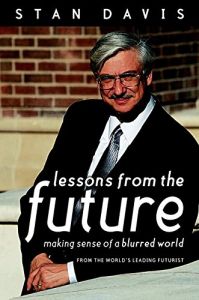Join getAbstract to access the summary!

Join getAbstract to access the summary!
Stan Davis
Lessons From The Future
Making Sense of a Blurred World
Capstone, 2001
What's inside?
Still an Information Age doubter? Consider this: American Airlines makes more money from its reservations systems than by flying airplanes and Ford makes more money financing cars than selling them.
Recommendation
This collection of essays links futurist Stan Davis’ previous works with some of his newer ideas about change and commerce. Believing that his ideas (Future Wealth, Blur, Future Perfect, 2020 Vision) have held up, he expands upon them to explain the philosophy he thinks underlies the next 20 years (or "the second half") of the information revolution. He delves into the next era he anticipates, one of even greater consequence - the Bio Economy. He explains not only the rise of biotech, but also the biological or networked economy, where everything is connected to everyone all the time. Moving from theoretical to practical, he advises judging your company’s worth by its predicted rate of growth and change, not by traditional measurements. Then, Davis speculates about the more distant future, post 2050, when cloning, stem-cell research and such transcend theory and join the chaos of our everyday lives. If the future makes you gasp, getabstract.com says read on.
Summary
About the Author
Stan Davis is an author and acclaimed public speaker based in Boston, Massachusetts. This is his 11th book. Some of his previous books include Future Wealth, Blur, the landmark Future Perfect, 2020 Vision and Future Perfect, 2020 Vision Monster under the Bed. He is also an independent strategy and management consultant to major corporations and fast growing enterprises, and part-time Senior Research Fellow at Cap Gemini Ernst & Young’s Center for Business Innovation.

















Comment on this summary